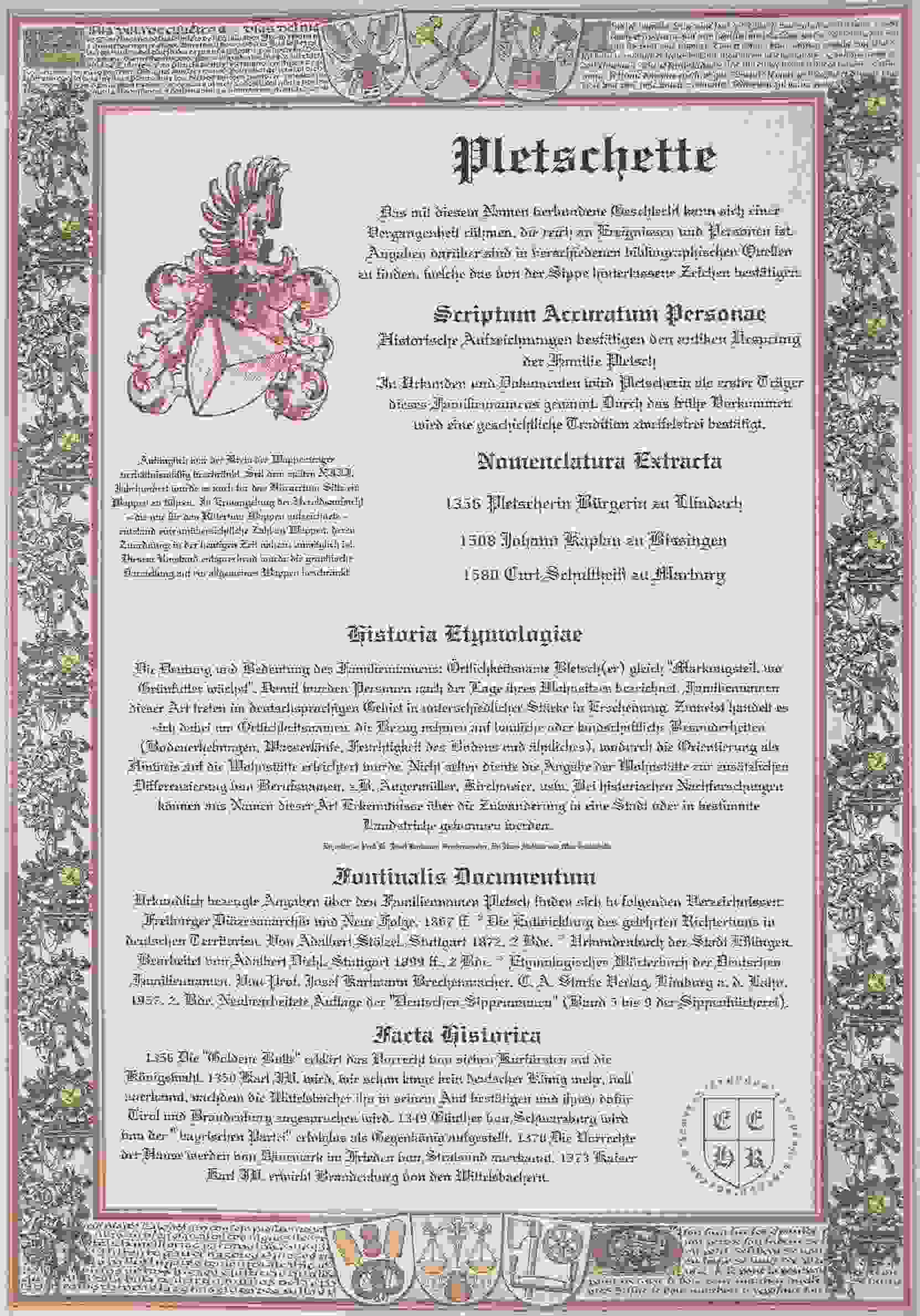Pletschette Family Tree - Homepage
________________________________________________________________________
INFORMATION about the Origin Grosbous, Nov. 27, 2000
of the name PLETSCHETTE last updated: Jan. 11, 2003
============================
________________________________________________________________________
Another possible Explanation of the origin could be as per
Jeannot Nehrenhausen:
"Pletschette" comes from the Latin name "Pilatus".
This original Roman name has been affected by various phonetic changes
during a period of more or less one thousand years
(1st > 10th century A.D.).
By the year 1000, this evolution came to an end, producing the
definitive form "Pletschette". During this millenarian period,
"Pletschette" has been a Christian name (first name),
that eventually became a family name about 1500.
Pilatus
Pilats removal of the "u"
Plats removal of the "i"
Plets "a" changes into "e"
Pletsch "s" changes into "sch"
Pletschette addition of the suffix "ette", being a diminutive with
the meaning of "little" (the little Pilatus).
As to this diminutive, compare with
1) the French : Anne > Annette
2) the German : Anna > Ännchen
In fact, the German suffix "chen" may be found in the orthographic
variant "gen", and you have the name "Pletgen", that has the same
meaning as "Pletschette".
Explanations given during a lunch discussion on the occasion of a
festivity in Holtz --------- on June 29, 2008.
----------revised version dated: July 6, 2008 by Jeannot
Jeannot has following possible explanation for the
origin of the name: Quinet
(( Quintus --> the fifth --> most likely not correct!))
(( Quintet ))
(( Quinet ))
but................................................2009-03-22
Quinet goes back to the French name Jacquinet,
meaning "little Jack"
(petit Jacques).
________________________________________________________________________
De Joseph HESS, a séngem Artikel "Zur Geschichte der Luxemburger
Familiennamen" (Institut Grand-Ducal, Section de linguistique.
Bulletin Linguistique et Ethnologique, Fascicule 16 (1970))
schreiwt beim:
Numm Pletschette: Hof bei Waldbillig,
mee dat wäärd Iech scho bekannt sinn.
Den Edouard Oster, a séngem Artikel "Nos noms de famille au
XVIIe siècle" (Biographie Nationale XIIIe fascicule (1965)), wou
en iwert Verdeelung fun de Lëtz. Familjennimm an den Zählungen
vun 1611 and 1652 schreiwt, seet p Säit 71:
Pletscheidt - Mersch 1656; Cense de Pletscheid 1611
Pletschet - Contern 1656; Cense de Pletscheydt,
seigneurie de Beaufort 1656
De Familjennumm schéngt mer also kloer vun éngem Toponym
ofgellet sinn.
Wat elo den Toponym -scheid ugeet, wir d'Buch vum Josy Meyers ze
recommandéeieren "Studien zur Siedlungsgeschichte Luxemburgs"
ausserdeem den Nicolas Van Werveke " Les noms de lieu en -scheid"
(Jahrburch 1930, Institut Grand-Ducal, section de linguistique)
Mat beschte Gréiss
Jean Ensch November 26, 2000
9, rue de la Résistance L-8020 Strassen, Luxembourg
http://www.igd-leo.lu E-mail: Jean.ensch@ci.rech.lu
________________________________________________________________________
Hello Fernand,
I checked in an old book called "luxemburger Volkskunde", written
by Prof. Jos. Hess in 1929. about "-schette" or "-scheid" .
He says :
Von der keltischen Sprache blieben fast nur ungeschriebene
Zeugnisse erhalten. Von den Berg-, Fluß-, und Ortsnamen des
Landes gehen manche auf einen keltischen Stamm zurück. (...)
Am häufigsten trifft man das keltische keiton, latinisiert
zu cetum, zu deutsch scheid an.
(...) aus der Betrachtung der luxemburgischen Scheidnamen
ergibt (sich dass in) vielen Fällen, wo der Wald
eine Grenze bildet, (diese) Bedeutung (gilt).(...) Die alte
Volksgrenze zwischen Eburonen und Treverern, die geologisch
das Oesling vom Gutland scheidet und die spätere Grenze von
Ober- und Niedergermanien, sowie der Diozesen Trier und Liege
bildete, fällt auf durch ihre -scheid-Orte.
That's all I could find so far, but I'll keep looking, if in the
meantime you do find something by yourself, I'll be glad to hear it
regards from Medernach
Linda -- linda@kengert.lu September 20, 2000
________________________________________________________________________
 ________________________________________________________________________
Everybody is welcome to mail us your feedback
Klick here to e-mail feedback
Fernand
________________________________________________________________________
Everybody is welcome to mail us your feedback
Klick here to e-mail feedback
Fernand
 ________________________________________________________________________
Everybody is welcome to mail us your feedback
Klick here to e-mail feedback
Fernand
________________________________________________________________________
Everybody is welcome to mail us your feedback
Klick here to e-mail feedback
Fernand